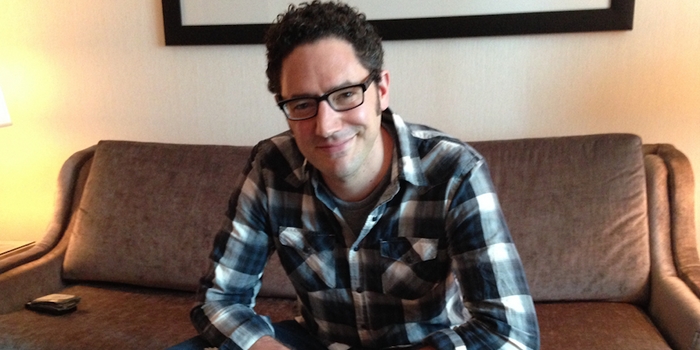
Editor’s Notes: The F Word is now playing wide in Canada and the United States.
Romantic comedies seem to bring out the inner cynic in all of us, since so few of them are able to convince us of the central romance at hand. When the characters come together at the end, we often don’t feel they’ve grown or deserve each other– and isn’t that frustrating? Next to hardboiled action flicks, the “rom-com” is one of cinema’s most disreputable genres, and at the same time ironically one of Hollywood’s most reliable cash-ins.
Elan Mastai, screenwriter of the new romantic comedy The F Word, which hit Canadian theatres last friday, had quite the feat when he first put pen to paper in 2005. Based already on an one-act Fringe play, Elan had the challenge of honouring the original material and extending it to feature length while avoiding the predictability and plot contrivances that typically plague the genre.
Certainly, audiences will know where The F Word is headed, but the writing, performances (especially by Daniel Radcliffe and Zoe Kazan), and Michael Dowse’s sweetly observant direction makes the film about the quirks of character rather than the mechanics of plot. The end result is not exactly a surprise, but the filmmakers complicate the means- and that is where the heart and humour makes its stamp.
I sat down recently with Elan to talk about the film, the writer’s role on set, memorable scenes, the added epilogue, how the new film fits within Dowse’s oeuvre, and finding his voice through an unexpected genre like the rom-com.
Parker: You started writing The F Word almost ten years ago. What was going on in your life then, career-wise?
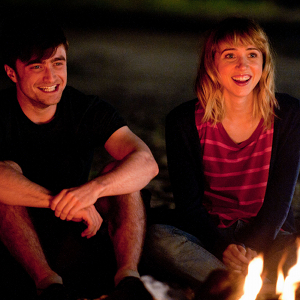
Elan Mastai: Not that much! I mean, I was trying to get my career as a screenwriter going. I had been lucky; I had a couple movies made. But they were assignment, work-for-hire gigs where someone was looking for a writer and I worked with the producer and director and try to execute what they were looking for. But they weren’t ones where I felt I really had my personal stamp on; they weren’t really my voice. I was trying to deliver what somebody else was looking for. And I kind of hit a point where, as much as I wanted to be a working screenwriter and was grateful for the opportunities I had, I really wanted to start writing something that was a little more personal – had my sense of humour. My take on things.
Parker: Before writing the screenplay, had you seen T.J. Dawe and Michael Rinaldi’s Toothpaste and Cigars, the play The F Word is based on?
Elan Mastai: I think I saw the play in 2004 – maybe December 2004 – I saw a spark and it sort of got a bunch of ideas flowing. I also felt there was a real simpatico between my voice as a writer and Mike and T.J.’s voice as playwrights. So, I was able to use it as a springboard while still hopefully honouring the source material and start writing about the issues I’d been grappling with in my personal life, observations that I had, and sort of conflicts about male and female friendships – what that whole dynamic is. I was just really interested in writing about that stuff. And writing in a way that was unique to myself, had my point of view.
Parker: What’s funny about The F Word is there are no “toothpaste and cigars”. As it translates, the movie could be called “Fool’s Gold”, but that’s taken. What were some of the other key differences between the play and your script?
Elan Mastai: It [Toothpaste and Cigars] was originally a one-act play, right? So it’s very funny and charming, and it’s a two-hander, so just the characters of Wallace and Chandry– Daniel Radcliffe and Zoe Kazan’s characters. The set up is very similar; they meet at a party and hit it off, but as their chemistry develops he discovers she has a boyfriend. But the whole play is really just the two of them. And although I found the play very funny and interesting and playful, it wasn’t really a movie. It was more like the beginnings of a movie.
I saw it at a little theatre– actually at a bar in Vancouver. Mark Stevenson, one of the producers on the movie, invited me to see it and there was something about it that was very compelling and tied in to a bunch of stuff that I was interested in exploring as a writer– in terms of men, women, relationships, and romance. The movie is, on one level, a very similar piece as the play and on another level it’s totally different because it’s much bigger.
Parker: Because there’s Ireland as well…
Elan Mastai: Yeah, of course there’s the whole Ireland section. But, you know, they say that sometimes a short story makes a better movie than a novel, because when you’re adapting a novel most of the time you’re just cutting away and boiling it down to its essence. Whereas with a short story, there’s a lot you can add and I felt the same in this case, because it’s basically a 30-minute play and so, as a writer, there was an opportunity to pour in my own interests and things I had been thinking about.
The idea with the title, too: I mean, “Toothpaste and Cigars” made sense in context to the play. In context to the movie, I felt like I also pursued the idea of friendship; and therefore, with The F Word, it was kind of a cheeky way of saying “The F Word”. It’s the dirtiest word in romance: Friends.
Parker: A colleague of mine mentioned that The F Word was an ironic title, because it actually seemed to be the sweetest movie by Michael Dowse, who’s known for the more raucous, rough-edged humour of Goon and FUBAR. So, what drew you to Michael as a director? Did you two have a pre-existing relationship?
Elan Mastai: We met when we started talking about doing this movie together. He read the script and had fell in love with it. But to some extent you’re correct– The F Word does seem like a different movie for Michael, but actually I think if you look back and watch his movies- one of the reasons they’re so beloved is – yeah, they’re raucous and edgy – but usually there’s strong character relationships built into them. They have a lot of heart. What people often say about Mike’s movies is the love story and the relationships between the characters are way more grounded and emotional than you expect. The dynamic between the guys in Fubar: there’s a lot of undercurrents that you’re not expecting, or even between Seann William Scott and Allison Pill’s characters in Goon–there’s a lot of sweet, off-kilter romance there that’s not the main story of the movie. So I think for Mike this was an opportunity to take those elements, which are in a lot of his movies, and make those the main story.
In terms of edgy, yeah, we wanted a movie that takes place in the real world, not this candy-coated, glib Hollywood version. In the real world, sometimes people are sweet, sometimes people are salty.
Parker: I understand there’s quite a bit of improv in The F Word. What scenes followed the “script as bible” model though? I recall one clever bit between Adam Driver and Daniel Radcliffe where they break down Wallace’s stalemated options for telling Chandry how he feels. “You can be sleazy, conniving, or pathetic”, Adam suggests. Their exchange has great comic rhythm, but it feels organized, carefully designed in a way that a written script can only provide.
Elan Mastai: Yeah, that’s a good example of a scene that’s scripted like exactly word-for-word. But the actors found great little ways to make it feel real, give it that authenticity. I mean there are little moments in that scene when Adam says something funny and Dan laughs at it. You often don’t see that in a movie, but in real life if your friend says something funny you laugh. But in movies people usually pretend like the funny thing that somebody said didn’t happen, because they are trying to preserve some sort of reality of the movie. But I find that more fake. That was a great scene to watch, as the writer seeing something you wrote very carefully, come off the way you hoped it would.
Parker: Was there any pressure writing for a sort of disreputable genre like the rom-com?
Elan Mastai: It took awhile to get it right, you know, because this kind of movie – I mean, we’ve all seen those terrible romantic comedies, you know, they’re cheesy, phoney, sometimes borderline sociopathic. And I didn’t want to write that. I wanted to write one that had a lot of heart and made people think and was set in the real world. The reason why you see so many that are bad is because it’s hard to do. (laughs) It’s hard to get it right. It took a little while, you know, I had to develop as a writer. I think where I was when I started and where I was when we made the movie, I had just matured as a writer. Matured as a person, too. So, I was able to explore these themes with the level of humour and heart I had wanted when I started, but I finally got there when we actually made the movie.
Parker: Are there any scenes in the film that you are proud of the most, or how they translated to the screen?
Elan Mastai: As a writer, it’s often the scenes that are a surprise to you. I’ll give you two examples: the scene outside The Royal Theatre, when they [Wallace and Chandry] run into each other after the movie. They have to decide: are they going to talk and acknowledge they’re standing there… what will there relationship be? It’s funny because Mike [Dowse] shot that scene from a lot of different angles and we took a long time to get that scene right. As a writer, I hadn’t thought of it as being that important of a scene; insofar as it wasn’t hard to write. It is an important scene though because it’s the moment where they make a decision to become friends. Little things like that become important. For me, the next scene- the one where they debate The Princess Bride and what it means, their cynicism and optimism about love- I rewrote that over and over just trying to get it perfect. And Mike shot it in like one take- like a steadicam shot- maybe two takes…
Parker: And where you demanding like “it should be longer; I spent so much time! What is this!”
Elan Mastai: I know! I spent so long writing this scene that we shot in 5 minutes, in like 2 takes and he’s like “yeah”. But the importance is where they decide to talk and decide to embark on the friendship. That was a very good observation as the director. That was a nice moment of realizing: yeah, I’ve passed this on to the director and, fortunately, a really good director.
The other scene I’d say was a pleasure… you know the first diner scene? It’s actually the next scene…
Parker: That’s the main screen cap for the film, right?
Elan Mastai: Right. They’re at the George Street Diner… they have this long, banter-y conversation. We actually shot that on the fourth day of production. It was the first scene when really it was Dan and Zoe together just riffing. It’s very scripted, but we also did a lot of improv that day. It captured the spirit we were after, which was very carefully planned but lively. But that was the day that Michael and I looked at each other and said these guys have fantastic chemistry. We just let the cameras roll, and Michael and I called out funny ideas and jokes and things for them to talk about. We realized: “okay, the movie’s gonna work.”
Parker: There were some changes post-TIFF, referring mainly to the ending. What happened with your rewrites and what was the motivation to add that last sequence?
Elan Mastai: I mean, we should be clear: the actual ending of the version at TIFF wasn’t “changed”. We added an epilogue. We come back to the characters and sort of what happens to them. Yeah, it came out of two impulses. When we were shooting the movie, this was a big conversation that we had: was the ending enough, would it provide the catharsis, would it provide the closure we wanted them to have? I actually wrote a couple epilogues as we were shooting the film, but we didn’t use any of them.
We sold the movie to CBS Films and that was a conversation we had with them. And it was also nice, because it was like “oh, I get to write for these characters again”.
Parker: How long had it been?
Elan Mastai: It was about a year. Essentially, when you see the epilogue they are literally 13 months older and that was kind of fun. In fact, there’s a baby in the scene and that’s my daughter, who was three months when we shot it and 16 months when we did the epilogue.
Parker: So why’s Boyhood getting all the recognition? The F Word achieved a similar feat!
Elan Mastai: Yeah, we totally Boyhood-ed it! So yeah, it was an interesting challenge coming back to a script you thought you were done with. But it was fun creatively bringing the band back together.
Parker: From your perspective, and for all the men out there, how does one avoid “the friend zone”?
Elan Mastai: I think the answer is to not think about it that way. Look, can men and women be friends? Sure. The question is whether you need to believe friends-in-quotes, where it’s completely platonic and you never have any messy emotional thoughts about somebody, you never even once considered what they look like naked or your funny banter never accidentally veered into flirtation… I mean, I think men and women are messy and when the neanderthals were sitting in their caves with their almond-sized brains they were drawing “can men and women be friends?”. (laughs) I think we’ve been grappling with these questions for a long time… I’m just exploring the comedy that comes out of the question.
—
For more with Elan Mastai, read Parker’s interview with him for his last movie The Samaritan starring Samuel L. Jackson.


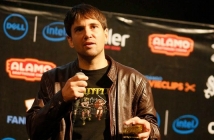
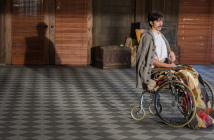
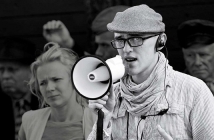
Pingback: yellow october()